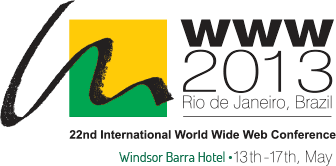Web Engineering
The World Wide Web offers a global platform for an increasing number of applications that have a major impact on business as well as everyday life. To be successful, these applications and solutions require advanced approaches that go beyond traditional hypertext concepts and utilize for example Collective Intelligence, Crowdsourcing, Socially-Enhanced Services Computing, Mobile Apps, and novel mechanisms such as Gamification. With the growing number of fields and business-critical tasks to be supported comes a vital need for systematic approaches to the development process. The distinct character of Web-based solutions forces a multidisciplinary approach to the development process, adopting ideas from such fields as Software Engineering, HCI, Databases, Information Sciences, Distributed Systems, and Web Science. As a research discipline, Web Engineering focuses on systematic, disciplined and quantifiable approaches towards successful development, composition, and evolution of high-quality, ubiquitously usable Web-based solutions.
This track invites original research submissions addressing all aspects of Web engineering. The topics of interest include, but are not restricted to the ones described below.
Topics
- Adaptive and context-aware Web applications and solutions
- Cloud services
- Crowdsourcing and Web Engineering
- Collective Intelligence for Web Engineering
- Mashups, apps, and other component models
- Model-driven Web application development
- Service discovery, orchestration, and choreography
- Socially-enhanced services computing
- Testing and evaluation of Web systems and applications
- Web design patterns and pattern mining
- Web Engineering development processes and methodologies
- Web quality and metrics for Web Engineering
- Web services, service-oriented Web applications, and collaborative workflows
- Web usability and accessibility
Track Chairs
- Schahram Dustdar TU Wien
- Geert-Jan Houben TU Delft
TPC Members
- Fabian Abel TU Delft
- Silvia Abrahão Universitat Politècnica de València
- Sören Auer Universität Leipzig
- Maria Bielikova Slovak University of Technology
- Alessandro Bozzon Politecnico di Milano
- Marco Brambilla Politecnico di Milano
- Jordi Cabot INRIA /École des Mines de Nantes
- Fabio Casati, University of Trento
- Sven Casteleyn Universidad Politécnica de Valencia
- Florian Daniel University of Trento
- Paul Dantzig IBM T.J. Watson Research Center
- Oscar Diaz University of the Basque Country
- Pater Dolog Aalborg University
- Flavius Frasincar Erasmus University Rotterdam
- Piero Fraternali Politecnico di Milano
- Martin Gaedke Chemnitz University of Technology
- Dragan Gasevic Athabasca University
- Maria da Graça Pimentel University of São Paulo
- Michael Grossniklaus Portland State University
- Simon Harper University of Manchester
- Gerti Kappel Vienna University of Technology
- Frank Leymann Universität Stuttgart
- Santiago Meliá Universidad de Alicante
- Ali Mesbah University of British Columbia
- Luis Olsina La Pampa National University
- Oscar Pastor Universidad Politecnica de Valencia
- Cesare Pautasso University of Lugano
- IV Ramakrishnan Stony Brook University
- Gustavo Rossi Universidad Nacional de La Plata
- Michael Sheng University of Adelaide
- Stefan Tai Karlsruhe Institute of Technology
- Takehiro Tokuda Tokyo Institute of Technology
- Bebo White SLAC National Accelerator Laboratory
- Erik Wilde EMC Corporation



















